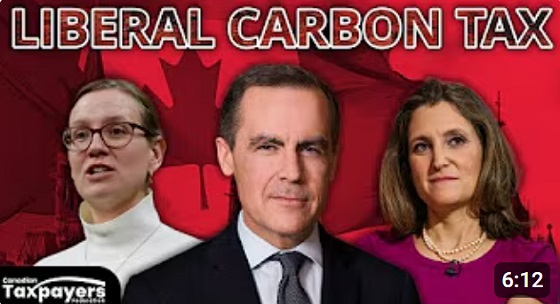Business
Mark Carney’s carbon tax plan hurts farmers

From the Canadian Taxpayers Federation
Liberal leadership front-runner Mark Carney recently announced his carbon tax plan and here are some key points.
It’s expensive for Canadians.
It’s even more expensive for farmers.
Carney announced he would immediately remove the consumer carbon tax if he became prime minister.
That sounds like good news, but it’s important to read the fine print.
Carney went on and announced that he would be “integrating a new consumer carbon credit market into the industrial pricing system.” Carney also said he would “improve and tighten” the industrial carbon tax and impose carbon tax tariffs on imports into Canada.
If that sounds like Carney isn’t getting rid of the carbon tax, that’s because he isn’t. He’s trying to hide the costs from Canadians by imposing higher carbon taxes on businesses.
What that means is that Carney’s plan would tax businesses and then businesses will pass those costs onto consumers.
That also means farmers.
Under the current carbon tax, farmers have an exemption from the carbon tax on the gas and diesel they use on their farm. The hidden industrial carbon tax is applied directly to industry. Businesses are forced to pay the carbon tax if they emit above the government’s prescribed limit.
But businesses don’t just swallow those costs. They pass them on. The trucking industry is a great example.
“Due to razor thin margins in the trucking industry, these added costs cannot be absorbed and must be passed on to customers,” said the Canadian Trucking Alliance when analyzing the current Trudeau carbon tax.
The same concept applies to the Carney scheme.
If Carney removes the consumer carbon tax and replaces it with a higher tax on businesses under the hidden industrial carbon tax, that means more costs for farmers.
There isn’t any exemption for farmers under the industrial carbon tax. Oil and gas refineries will be paying a higher carbon tax and they will be forced to pass that cost onto their consumers. Farmers use a lot of fuel.
The pain doesn’t stop there. Farmers also use a lot of fertilizer and Carney’s carbon tax means higher costs for fertilizer plants. Then farmers will be stuck paying more for fertilizer.
Some businesses, like those fertilizer plants, could pack up and move production south. But farmers are still going to need fertilizer. Carney’s plan compounds the pain with carbon tax tariffs.
Fertilizer is only one example. If Canadian farmers need to buy a part to fix equipment that can only come from the U.S., it could be more expensive because of Carney’s carbon tax tariffs.
This will hurt Canadian farmers when they’re buying supplies. But it’ll also hurt when farmers when they go to market. Canadian farmers compete with farmers around the world and majority of them aren’t paying carbon taxes.
Farmers wouldn’t be at a disadvantage because American farmers are smarter or farm better, but because, under Carney’s carbon tax, they would be stuck paying costs competitors don’t have to pay. And farmers know this all too well.
“My competitors to the south of me in the United States do not pay that [carbon] tax, so now my cost goes up and I have no alternative,” said Jeff Barlow, a corn, wheat and soybean farmer in Ontario. “By penalizing me there’s nothing else that I can do but just be penalized.”
And if farmers won’t be the only ones hurt.
Families across Canada are struggling with grocery prices and increasing the cost of production for farmers certainly won’t lower those prices.
Carney says that he wants to cancel the consumer tax because it’s too “divisive.” That statement misses the nail completely and hammers the thumb. Canadians don’t want to get rid of the carbon tax because of perception, they want to get rid of it because it makes life more expensive.
Carney needs to commit to getting rid of carbon taxes, not rebranding the failed policy into something that could end up costing Canadians and farmers even more.
2025 Federal Election
MEI-Ipsos poll: 56 per cent of Canadians support increasing access to non-governmental healthcare providers

-
Most believe private providers can deliver services faster than government-run hospitals
-
77 per cent of Canadians say their provincial healthcare system is too bureaucratic
Canadians are increasingly in favour of breaking the government monopoly over health care by opening the door to independent providers and cross-border treatments, an MEI-Ipsos poll has revealed.
“Canadians from coast to coast are signalling they want to see more involvement from independent health providers in our health system,” explains Emmanuelle B. Faubert, economist at the MEI. “They understand that universal access doesn’t mean government-run, and that consistent failures to deliver timely care in government hospitals are a feature of the current system.”
Support for independent health care is on the rise, with 56 per cent of respondents in favour of allowing patients to access services provided by independent health entrepreneurs. Only 25 per cent oppose this.
In Quebec, support is especially strong, with 68 per cent endorsing this change.
Favourable views of accessing care through a mixed system are widespread, with three quarters of respondents stating that private entrepreneurs can deliver healthcare services faster than hospitals managed by the government. This is up four percentage points from last year.
Countries like Sweden and France combine universal coverage with independent providers and deliver faster, more accessible care. When informed about how these health systems run, nearly two in three Canadians favour adopting such models.
The poll also finds that 73 per cent of Canadians support allowing patients to receive treatment abroad with provincial coverage, which could help reduce long wait times at home.
Common in the European Union, this “cross-border directive” enabled 450,000 patients to access elective surgeries in 2022, with costs reimbursed as if they had been treated in their home country.
There’s a growing consensus that provincial healthcare systems are overly bureaucratic, with the strongest agreement in Alberta, B.C., and Quebec. The proportion of Canadians holding this view has risen by 16 percentage points since 2020.
Nor do Canadians see more spending as being a solution: over half say the current pace of healthcare spending in their province is unsustainable.
“Governments shouldn’t keep doubling down on what isn’t working. Instead, they should look at what works abroad,” says Ms. Faubert. “Canadians have made it clear they want to shift gears; now it’s up to policymakers to show they’re listening.”
A sample of 1,164 Canadians aged 18 and older was polled between March 24th and March 28th, 2025. The margin of error is ±3.3 percentage points, 19 times out of 20.
The results of the MEI-Ipsos poll are available here.
* * *
The MEI is an independent public policy think tank with offices in Montreal, Ottawa, and Calgary. Through its publications, media appearances, and advisory services to policymakers, the MEI stimulates public policy debate and reforms based on sound economics and entrepreneurship.
2025 Federal Election
POLL: Canadians say industrial carbon tax makes life more expensive

The Canadian Taxpayers Federation released Leger polling showing 70 per cent of Canadians believe businesses pass on most or some of the cost of the industrial carbon tax to consumers. Meanwhile, just nine per cent believe businesses pay most of the cost.
“The poll shows Canadians understand that a carbon tax on business is a carbon tax on Canadians that makes life more expensive,” said Franco Terrazzano, CTF Federal Director. “Only nine per cent of Canadians believe Liberal Leader Mark Carney’s claim that businesses will pay most of the cost of his carbon tax.
“Canadians have a simple question for Carney: How much will your carbon tax cost?”
The federal government currently imposes an industrial carbon tax on oil and gas, steel and fertilizer businesses, among others.
Carney said he would “improve and tighten” the industrial carbon tax and extend the “framework to 2035.” Carney also said that by “changing the carbon tax … We are making the large companies pay for everybody.”
The Leger poll asked Canadians who they think ultimately pays the industrial carbon tax. Results of the poll show:
- 44 per cent say most of the cost is passed on to consumers
- 26 per cent say some of the cost is passed on to consumers
- 9 per cent say businesses pay most of the cost
- 21 per cent don’t know
Among those decided on the issue, 89 per cent of Canadians say businesses pass on most or some of the cost to consumers.
“Carbon taxes on refineries make gas more expensive, carbon taxes on utilities make home heating more expensive and carbon taxes on fertilizer plants increase costs for farmers and that makes groceries more expensive,” Terrazzano said. “A carbon tax on business will push our entrepreneurs to cut production in Canada and increase production south of the border and that means higher prices and fewer jobs for Canadians.”
-

 2025 Federal Election2 days ago
2025 Federal Election2 days agoNo Matter The Winner – My Canada Is Gone
-

 2025 Federal Election2 days ago
2025 Federal Election2 days agoASK YOURSELF! – Can Canada Endure, or Afford the Economic Stagnation of Carney’s Costly Climate Vision?
-

 Alberta2 days ago
Alberta2 days agoMade in Alberta! Province makes it easier to support local products with Buy Local program
-

 2025 Federal Election2 days ago
2025 Federal Election2 days agoCSIS Warned Beijing Would Brand Conservatives as Trumpian. Now Carney’s Campaign Is Doing It.
-

 Alberta2 days ago
Alberta2 days agoProvince to expand services provided by Alberta Sheriffs: New policing option for municipalities
-

 2025 Federal Election1 day ago
2025 Federal Election1 day agoInside Buttongate: How the Liberal Swamp Tried to Smear the Conservative Movement — and Got Exposed
-

 Bruce Dowbiggin1 day ago
Bruce Dowbiggin1 day agoIs HNIC Ready For The Winnipeg Jets To Be Canada’s Heroes?
-

 Dr. Robert Malone1 day ago
Dr. Robert Malone1 day agoThe West Texas Measles Outbreak as a Societal and Political Mirror








